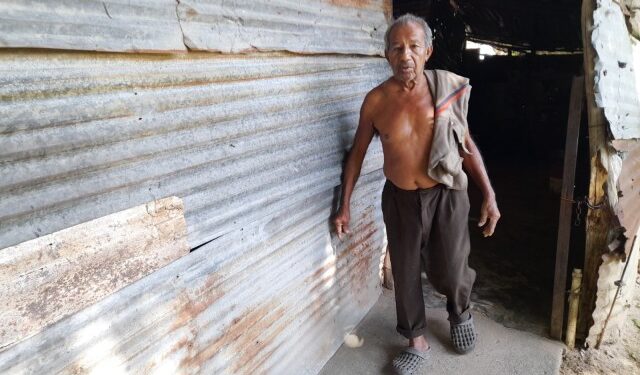La dura realidad de muchos venezolanos en el Día de la Alimentación
“I eat very very measuredly. Here where I live there are many underweight children, but there also are others who weigh more than me.” That is the reality of Luis Nieves, an 84-year-old man, legally incapacitated according to labor law, from the time he worked at the CVA (Venezuelan Agrarian Corporation and later renamed Venezuelan Food Corporation), which “did not remember me ever again.”
Walter Obregón / Correspondent lapatilla.com
Nieves has difficulty walking, and logically, working. He lives alone in a sheet metal “rancho” (shack) in the Buena Vista allotment, located to the side of the Barinas inter-communal avenue. A few meters away lives his son with his family, who also have economic problems, so he is forced to depend on the CLAP bag (Local Council of Food and Production food aid bag), which arrives only once a month to that community. The man also survives with the little that his relatives can spare him.
Bolívar Rivera Montalbán, 86 years old, is under similar conditions to those of Luis Nieves: he is alone in a sheet metal shack, he walks with difficulty, he sleeps in a hammock, his kitchen is a wood stove and he receives his food aid bag once a month, when the CLAP bag arrives, they don’t have to pay for it.
“One day I eat rice, another day I eat beans, and that’s how I go every day. I prepare just one thing so that I can go through whatever the food aid combo (CLAP) brings during the month and are able to eat three times a day. But I no longer remember when I last ate meat or chicken.”
Every November 18th, World Food Day is celebrated in Venezuela. In school institutions, especially from preschool to basic education, it is a mandatory matter to organize a sharing between teachers and students, talk about the benefits of eating well, in a balanced way, mentioning which proteins, vegetables, fruits, which make more delicious the plate of every meal, although currently that is an unattainable dream for most families in this country.
“In schools we encounter situations that are difficult to explain. Poor nutrition is not only affecting the students, who even come to classes without having had breakfast, but it is a reality that we are experiencing with our teachers, who on the one hand send their children to school and they go on the other to give classes, without either of them having enjoyed the first meal of the day,” laments the Barinas teachers’ union member, Víctor Venegas.
Venezuela under the UN’s watch
The Food and Agriculture Organization of the United Nations (FAO), in the 2023 edition of the Regional Panorama of Food Security and Nutrition, presents an update of the data and trends in food security and nutrition in the recent past years.
The most recent data shows that between 2021 and 2022, progress was made in reducing hunger and food insecurity in Latin America and the Caribbean, including Venezuela. However, the progress achieved is far from the established goals of ending hunger and thus meeting the Sustainable Development Goal.
“One in five people in the region cannot access a healthy diet and suffer malnutrition in all its forms, including childhood stunting, micronutrient deficiencies, and overweigh and obesity continue to be a major challenge in the region.” states the report presented.
Looking back to the year 2022, through the FAO report it was learned that in Venezuela 6.5 million people went from not eating well to suffering hunger. In that same specialized report, it was specified that 4.1% of Venezuelan children under five years of age suffered from acute malnutrition, which is a condition that ‘endangers the lives’ of those who suffer from it and is caused by insufficient intake of energy and nutrients, poor absorption of energy and nutrients or frequent or prolonged illness.
Between January and August 2022, 8,199 children under five years of age were diagnosed with acute malnutrition in Venezuela.
Also based on the data provided in that specialized report, the UN and its partners assisted 344,300 people in whom they detected problems related to nutrition. Of these people, about 4,600 were pregnant and breastfeeding women, who were also underweight.
According to the report, hunger rates decreased in Venezuela, but the progress towards recovery has been so low that malnutrition statistics in this country place it among the five countries with this type of problems, after Haiti, Bolivia, Honduras and Nicaragua.
Food insecurity
La dura realidad de muchos venezolanos en el Día de la Alimentación
Consultores 21, a surveying company that has focused on the areas of market research and public opinion for 38 years, conducted a survey two months ago to find out where stands the food security of Venezuelans. With a sample in eight regions of the country, the results are worrying because nothing has really improved in Venezuela.
The Venezuelan consulting company, as it explains, used a short scale with six items or questions, designed by the United States Department of Agriculture (USDA), through which they managed to determine that out of 10 Venezuelan households, seven suffer from “some degree of food insecurity.”
The discouraging result shows that the numbers for 2022 remain the same, that is, there is stagnation in the progress of family food guarantee for Venezuelans.
Another unfavorable data for Venezuela was presented by the World Bank in June of this year, placing us at the head of a list of 10 countries with ‘nominal food inflation’, because they estimated it to be the highest in the world at 414 % year on year.
Survive with the CLAP food aid
As an example of the low purchasing power of Venezuelans, we have as an example Luis Nieves from the Buena Vista subdivision in Barinas, when he states: “A lot of poor people live here,” taking his condition and that of his neighbors as a reference.
“The CLAP food aid bag is enough for me for five days a month, because if someone who is hungry comes to visit me, mostly children, I share what I have. That guarantees me that when I don’t have anything, they may bring me an ‘arepita’ (diminutive of arepa, cornbread bun) one day, others come some other day and that’s how I survive.”
The alternate councilor of the Barinas Municipality, Arnoldo Rubio, is well versed in the way of life of the people in these neighborhoods and sectors, including those that were founded about 20 years ago and have not yet been consolidated.
“There are families that have no way to alleviate food insecurity, because around them there are no sources of employment that could help them round out the salary of an employee or worker in the public administration, thus reflecting great precariousness. That’s why there is a diaspora,” he explains.
Bolívar Rivera Montalbán, being an elderly person, looks for a way to fend for himself. However, there are realities that do not favor him, such as, for example, the pension he receives of 130 bolivars per month, which in his opinion “is not enough at all.”
Moving from the Buena Vista allotment to the bank and returning to his sheet metal shack costs 20 bolivars, so he only has 110 bolivars left to eat, because he never bought clothes again, nor personal hygiene products, among other things.
What to do about it?
La dura realidad de muchos venezolanos en el Día de la Alimentación
Venezuela has almost 90% of families with insufficient resources to buy varied and nutritious food, and more than 80% ate less than they should due to lack of money, according to the report presented by Consultores 21. The most important and immediate thing would be to implement a salary adjustment, as demanded by Venezuelan unions.
Likewise, guarantee the fuel that, due to the current supply crisis, has slowed down the work in the fields and farms to advance in the preparation of the upcoming sowing and harvest cycle, as explained by the spokespersons of the country’s agricultural federations, which It would also prevent the increase in prices in the agricultural, fruit and vegetable markets, thus making these foodstuffs more accessible to the consumer.
The country must improve public services, primarily water and electricity supply, essential for the quality of life and productive undertaking of commerce in general, which depends on these services for the generation of jobs, as demanded by large, medium and small merchants who have so far refused to close their establishments despite the economic crisis.









